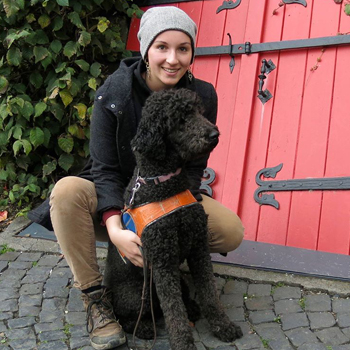Tiamat Warda
For six years, I worked as a self-employed guide dog mobility instructor. My practical experiences during this time opened my eyes to the challenges and hardships which many in the guide dog sector encounter - especially, it could be argued, the guide dogs themselves. Acknowledging these realities is what initially motivated me pursue academia with the hope of contributing to future developments in the sector through research. I embarked on the MA in Anthrozoology at the University of Exeter in 2017 and graduated with distinction in 2019. Throughout my MA, I kept my focus on dog-human relationships and interactions, which guided me in a fluid motion towards the topic of my PhD.
My PhD research addresses a gap in existing literature on the work-lives of guide dogs and guide dog mobility instructors, as well as the schooling of guide dog teams. The schooling period is the time following a guide dog's training during which they and their new visually impaired human partner learn to work and live as a team. The guide dog mobility instructor coaches the team through this process of forming a partnership for, on average, three weeks. These three weeks can often be quite emotional (consisting of highs, as well as lows for, often, everyone involved) and tend to require the guide dog, their visually impaired human partner, as well as the guide dog mobility instructor to perform an outward, visible management of emotions - also known as emotional labour. My PhD explores the question: How might the emotional labour performed by guide dogs and guide dog mobility instructors during the three-week schooling period affect their work-lives and wellbeing?
This research's methodology includes interviews, accompanying schooling periods, as well as autoethnographic data. My hope is that outcomes can be applied within the guide dog sector in order to improve wellbeing during the schooling process for guide dogs and instructors. Results may, for example, be able to support the education of future guide dog mobility instructors on how they might better prepare themselves and the guide dogs for the emotional labour they may perform during schooling periods.

